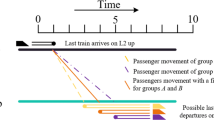Abstract
Metro transmits, as the backbone of urban public transit, plays an important role in alleviating congested traffic and shaping low-carbon and comfortable trip mode. With the rapid development of urban rail transit, the traffic of the city cannot be separated from the subway; however, large passenger flow triggers heavy traffic accident easily and reduces the degree of comfort greatly, especially when up and down trains arriving at the same station simultaneously. To implement urban railway transit system optimization and to achieve the goal of up and down trains arrive at a station asynchronously, situations of trains arriving at the platform are studied, and a quantitative analysis of different time periods and different types of platforms are completed. The definition of the train conflict time of arriving at a station simultaneously is given. Through the derivation and calculation of the total use of the subway conflict time, to identify the key variables that affect the conflict time, a solution of using greedy algorithm to adjust conflict time is proposed. Simulation through Visual C++ platform demonstrates that the algorithm can provide optimal railway timetables while satisfying operational constraints. Comparative analysis of the results showed that: if passenger flow is considered, departure time, interval time and dwell time are invariant, only adjusting the morning peak-hours is 19.76 % superior than the unadjusted state, while adjusting the morning and evening peak-hours is 34.85 % prior. The models can be further expanded to develop models and algorithms for estimating the conflict time of up and down trains and reduce the conflict time.
Access this chapter
Tax calculation will be finalised at checkout
Purchases are for personal use only
Similar content being viewed by others
References
Peng, P., Liu, Y.: The impact of metro development on urban modernization. Urban Insight (2012)
Nachtigall, K.: Periodic network optimization with different arc frequencies. Discrete Appl. Math. 69, 1–17 (1996)
Peeters, L.W.P.: Cyclic Railway Timetable Optimization. Erasmus University Rotterdam, Rotterdam (2003)
Serafini, P., Ukovich, W.: A mathematical model for periodic scheduling problems. SIAM J. Discrete Math. 2(4), 550–581 (1989)
Odijk, M.A.: A constraint generation algorithm for the construction of periodic railway timetables. Transp. Res. Part B: Methodol. 30(6), 455–464 (1996)
Nachtigall, K.: Periodic network optimization with different arc frequencies. Discrete Appl. Math. 69(1), 1–17 (1996)
Cordone, R., Redaelli, F.: Optimizing the demand captured by a railway system with a regular timetable. Transp. Res. Part B: Methodol. 45(2), 430–446 (2011)
Kroon, L.G., Peeters, L.W.P.: A variable trip time model for cyclic railway timetabling. Transp. Sci. 37(2), 198–212 (2003)
Odijk, M.A., Romeijn, H.E., van Maaren, H.: Generation of classes of robust periodic railway timetables. Comput. Oper. Res. 33(8), 2283–2299 (2006)
Kroon, L., Maróti, G., Helmrich, M.R., et al.: Stochastic improvement of cyclic railway timetables. Transp. Res. Part B Methodol. 42(6), 553–570 (2008)
Khan, M.B., Zhou, X.: Stochastic optimization model and solution algorithm for robust double-track train-timetabling problem. IEEE Trans. Intell. Transp. Syst. 11(1), 81–89 (2010)
Yugang, Z., Baohua, M., Yu, J.: Stick buffer time based on train running time deviation subway train operation diagram. China Railway Sci. 2(1), 118–121 (2011)
Albrecht, T.: Reducing power peaks and energy consumption in rail transit systems by simultaneous train running time control. WIT Trans. Built Environ. 74 (2004)
Chen, J.F., Lin, R.L., Liu, Y.C.: Optimization of an MRT train schedule: reducing maximum traction power by using genetic algorithms. IEEE Trans. Power Syst. 20(3), 1366–1372 (2005)
Kim, K.M., Oh, S., Han, M.: A mathematical approach for reducing the maximum traction energy: the case of Korean MRT trains. Power 219, 15.3 (2010)
Wang, S.: Research on randomized greedy algorithm for k-median problem. Comput. Sci. 1(7), 98–101 (2011)
Toint, P.L.: On sparse and symmetric matrix updating subject to a linear equation. Math. Comput. 31(140), 954 (1977)
Abalakin, I.V., Kozubskaya, T.K.: A multi-parameter family of schemes of high accuracy for a linear transport equation. Matematicheskoe Modelirovanie 7, 55–66 (2007)
He, Z., Li, H., Miao, J., et al.: Research on Greedy train rescheduling algorithm (2009)
He, Z.: Research on improved greedy algorithm for train rescheduling. In: International Conference on Computational Intelligence and Security, pp. 1197–1200. IEEE (2011)
Park, J.K., Lee, K.H., Lee, J.H., et al.: An exhaustive method for characterizing the interconnect capacitance considering the floating dummy-fills by employing an efficient field solving algorithm. In: 2000 International Conference on Simulation of Semiconductor Processes and Devices, SISPAD 2000, pp. 98–101. IEEE (2000)
Author information
Authors and Affiliations
Corresponding author
Editor information
Editors and Affiliations
Rights and permissions
Copyright information
© 2016 Springer Science+Business Media Singapore
About this paper
Cite this paper
Yan, D., Mao, J., Liu, X., Yang, M. (2016). Subway Timetable Adjusting Method Research of Bi-directional Trains Arriving at a Station Asynchronously. In: Wu, J., Li, L. (eds) Advanced Computer Architecture. ACA 2016. Communications in Computer and Information Science, vol 626. Springer, Singapore. https://doi.org/10.1007/978-981-10-2209-8_17
Download citation
DOI: https://doi.org/10.1007/978-981-10-2209-8_17
Published:
Publisher Name: Springer, Singapore
Print ISBN: 978-981-10-2208-1
Online ISBN: 978-981-10-2209-8
eBook Packages: Computer ScienceComputer Science (R0)





